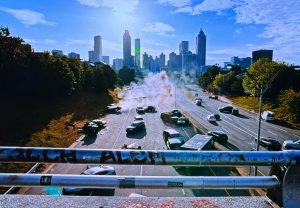Yorgos Lanthimos quietly made his best film with Bugonia. I say quietly because no one in the Film Twitterverse will see it that way or will say so, at least not that I’ve seen. But this film is, to my mind, his best. It’s the deepest, the most interesting, the least indulgent. The problem with it is that, like Eddington, it’s ahead of its time. Bugonia will be watched for many years in the future, and people will think, Ah, that reflects American society perfectly.
Glancing at the critic reviews it looks to me like most people didn’t get it. That shouldn’t be surprising if you’ve been reading this site for a while now. My contention is that the hive mind of Film Twitter, Hollywood itself, and the Oscars exist inside of a bubble, and much of the news happening in the country simply never penetrates the surface. Everything cycles through the bubble, and when it hits the surface, it bounces back down. They shut themselves off from the real world, and that has cost them in so many ways, but the biggest way is that they not only can’t see the truth, but they also can’t say it, even if they could.
I watched it twice and then, around 3am, I got what I think it’s really about. This could just be my own perception of it, reading into it too much, but how I interpret it is that it is like Eddington, one of the few films that is about right now. It’s less about the Right than it is about the Left, which might be why it’s harder for critics to see it or understand it.
To talk about Bugonia, I have to use spoilers, so if you haven’t seen it and you’d like to avoid how it ends, don’t read this. But there isn’t a way to talk about it without spoiling the ending because, as with the best movies this year — Hamnet, Sinners, Sentimental Value, and even One Battle — the ending is the best part. So if you’d like to have the movie spoiled, read on.
If we lived at a time when artists had the eyes to see and the courage to say (they do not, not in Hollywood) at the end of One Battle After Another we would macro out and Bugonia would begin. Emma Stone would not be a high-powered corporate executive pushing empowerment and DEI but rather, a studio exec amid the Great Feminization. One Battle does not reflect the views of minority groups so much as it reflects the views of the white ruling class, who are always seeking ways to absolve themselves of their guilt, their wealth, their privilege by elevating marginalized groups.
We call this The Great Awokening, a movement that hit about ten years ago but reached a fever pitch in 2020 and swallowed up Hollywood, thus destroying it for the foreseeable future, with no end in sight. Hollywood makes movies for itself, movies about identity, movies that lecture the beleaguered public on what they should want versus what they do want. It’s as though McDonald’s suddenly decided to serve raw broccoli and vegan burgers. No one would be surprised that the company tanked.
At first glance, Bugonia looks like a movie about a crazy conspiracy theorist who captures Emma Stone because he thinks she’s an alien. He traps her, tortures her, and finally, she outsmarts him and escapes. She finds bodies and body parts in his house, and we assume he’s crazy. But then, of course, it turns out she is an alien and finds humanity isn’t worth saving. She tried. So she ends humanity by piercing the bubble that kept all of us alive. By the way, bravo to Lanthimos for that last part — still life of a wiped out humanity. Brilliant.
If that were the movie, then I would think it was good but not great. But, to me, that isn’t the movie. It’s really not about humanity failing so much as it explains what’s happened to life in America at the hands of the Left or collectivism. It has, essentially, killed Hollywood because it turned art into dogma. But art is alive, albeit subversive.
Think: Hitchcock amid the Hays Code. It’s not how to outsmart the censors so much as it is how to outsmart the scolds and the hive mind. Hollywood lives in fear of the finger-pointing. The scolds are always at the ready to ensure correctness. This has never been truer than it is in the Oscar race. But two movies, Eddington and now Bugonia, challenge the status quo and comment on our world in clever, surreptitious ways.
What if a “woke” alien species came down to earth to try to make us all better? Better people, correct people, inclusive people, GOOD people, but someone — a heterosexual white male perhaps — noticed and wondered, what gives? So in a way, it lampoons both the woke and the critics of the woke, just like Eddington does. And that is why it is a great movie. It tells the truth of a sharply divided, polarized world of two tribes of humans existing mostly online: virtue signalers and trolls.
The biggest irony of all is that when they get mad at the two men who fail because Emma Stone’s standards are so impossibly high, it is decided that humanity should be wiped out. Then, Lanthimos reveals a haunting tableau of humanity caught just before the oxygen ran out – in all of its splendor and misery. Our silly lives of having sex, lying on the beach, contrasted with extreme poverty, people digging through trash – the third world. Working, playing, studying, eating, praying, all over the world – humanity’s end.
I watched that last part with my mouth hanging open at the brilliance of it. Yorgos Lanthimos has the eye of a master painter. “When will they ever learn,” asks the song at the end. Never. We will never be perfect. We are all struggling every day with our better angels, doing the best we can, surviving.
I don’t know if that’s right, but that’s how I saw it, and I found it to be absolutely hilarious. The Left would absolutely end humanity if they could not perfect it, or at least the non-compliant humans. They have become intolerant and intolerable. On the Right, because culture has abandoned them, there is too much of an inclination to be suspicious and fall into conspiracy theories, which might be partly true but always take them to a much darker place. The film makes fun of both the Left’s utopian ideas of humanity and the Right’s anger against how things have changed.
Of course, it’s also about climate change in its own way, too – per the original. The idea being, humans destroyed their own habitat and can’t be cured, so let’s obliterate them and let the planet exist free from our massive, destructive footprint.
Jesse Plemons isn’t your typical crazy Incel trying to capture a butterfly that is Emma Stone to destroy her because she’s a powerful woman. He just happens to be the only guy who can see what has happened to society after these aliens moved in. A white man who has been abandoned and ejected by the Left’s utopian worldview. Chemical castration is how he can free himself of the pain of wanting what he’ll never have, so he can focus on the task at hand. He seems crazy, of course, and no one would ever imagine he could be telling the truth.
Naturally, the Jesse Plemons character would know something was off, which would begin his quest to figure out what went wrong. You can read that as an angry white man if you’d like, but it’s also possible that, since he’s been exiled from those who are valued in the group (everyone except heteronormative white men) that he could see things other people can’t.
In the end, we see the higher beings as blobby and sexless, but no white men anywhere. Women and people of color comprise the elders. I don’t think it was cast that way just to follow the strident rules of the woke mandate, but rather, as commentary to make this more about our culture now. I loved it.
Both Eddington and Bugonia deserve screenplay nominations, and if they don’t get them, the writers are clueless now as to what good writing is. This is good writing. Piercing the delusions and exposing the truth, even if it’s hard to look at sometimes. Bugonia is one of the best films of the year.

























